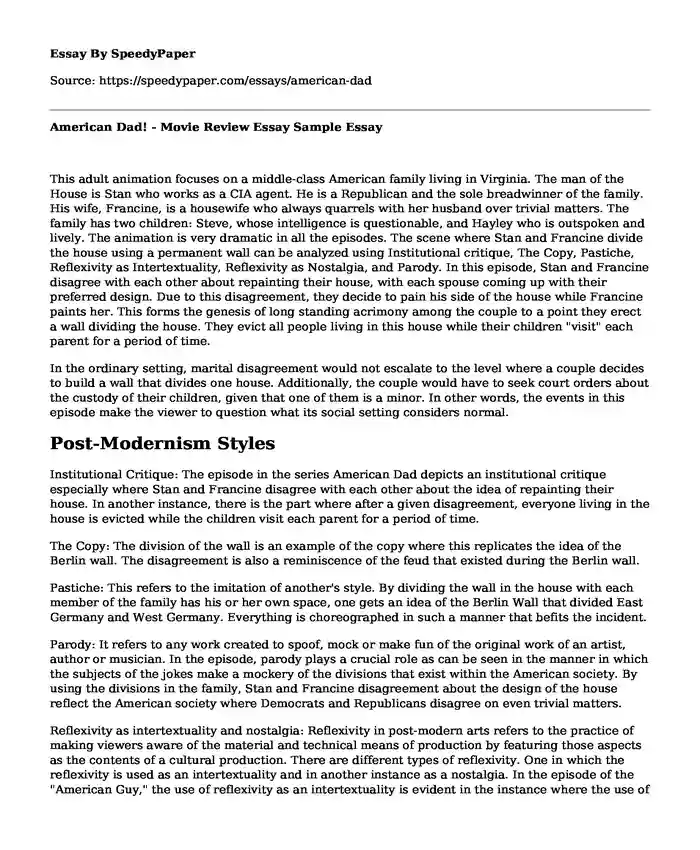This adult animation focuses on a middle-class American family living in Virginia. The man of the House is Stan who works as a CIA agent. He is a Republican and the sole breadwinner of the family. His wife, Francine, is a housewife who always quarrels with her husband over trivial matters. The family has two children: Steve, whose intelligence is questionable, and Hayley who is outspoken and lively. The animation is very dramatic in all the episodes. The scene where Stan and Francine divide the house using a permanent wall can be analyzed using Institutional critique, The Copy, Pastiche, Reflexivity as Intertextuality, Reflexivity as Nostalgia, and Parody. In this episode, Stan and Francine disagree with each other about repainting their house, with each spouse coming up with their preferred design. Due to this disagreement, they decide to pain his side of the house while Francine paints her. This forms the genesis of long standing acrimony among the couple to a point they erect a wall dividing the house. They evict all people living in this house while their children "visit" each parent for a period of time.
In the ordinary setting, marital disagreement would not escalate to the level where a couple decides to build a wall that divides one house. Additionally, the couple would have to seek court orders about the custody of their children, given that one of them is a minor. In other words, the events in this episode make the viewer to question what its social setting considers normal.
Post-Modernism Styles
Institutional Critique: The episode in the series American Dad depicts an institutional critique especially where Stan and Francine disagree with each other about the idea of repainting their house. In another instance, there is the part where after a given disagreement, everyone living in the house is evicted while the children visit each parent for a period of time.
The Copy: The division of the wall is an example of the copy where this replicates the idea of the Berlin wall. The disagreement is also a reminiscence of the feud that existed during the Berlin wall.
Pastiche: This refers to the imitation of another's style. By dividing the wall in the house with each member of the family has his or her own space, one gets an idea of the Berlin Wall that divided East Germany and West Germany. Everything is choreographed in such a manner that befits the incident.
Parody: It refers to any work created to spoof, mock or make fun of the original work of an artist, author or musician. In the episode, parody plays a crucial role as can be seen in the manner in which the subjects of the jokes make a mockery of the divisions that exist within the American society. By using the divisions in the family, Stan and Francine disagreement about the design of the house reflect the American society where Democrats and Republicans disagree on even trivial matters.
Reflexivity as intertextuality and nostalgia: Reflexivity in post-modern arts refers to the practice of making viewers aware of the material and technical means of production by featuring those aspects as the contents of a cultural production. There are different types of reflexivity. One in which the reflexivity is used as an intertextuality and in another instance as a nostalgia. In the episode of the "American Guy," the use of reflexivity as an intertextuality is evident in the instance where the use of the Alien is a reminiscence of the alien in the "Blue Harvest" episode of Family Guy and Star Wars film.
Section 2
Hyperrealism
Blue Chilaba: The picture above depicts a hyperrealism painting by Claudio Bravo. It was completed in 1995. And, the subject of the painting is an old monk attired in a blue robe.
The Red Still Life is a hyperrealism painting by Claudio Bravo. It was completed in the year 1984. And, the subject of the painting is a beautiful laid table with a table cloth in it. The red scene gives it life.
Intertextuality
The image above depicts intertextuality in art. It depicts an image of a baby drowning just to get a dollar note. The text Nirvana is ironic in this case because Nirvana advocates for austerity and being devoid of desires.
The image above depicts a sculpture stone with a caption that reads "The Bad artists imitate, the great artists steal." It is an intertextual because one would tell that the artists stole if he is to be considered great or else he is a bad artist.
Cite this page
American Dad! - Movie Review Essay Sample. (2022, Mar 14). Retrieved from https://speedypaper.net/essays/american-dad
Request Removal
If you are the original author of this essay and no longer wish to have it published on the SpeedyPaper website, please click below to request its removal:
Popular categories





